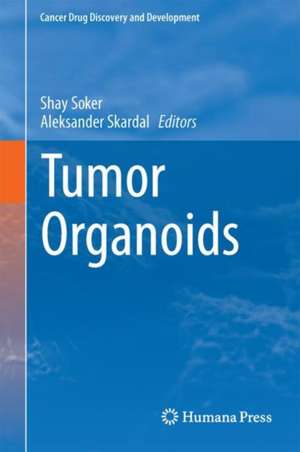Tumor Organoids: Cancer Drug Discovery and Development
Editat de Shay Soker, Aleksander Skardalen Limba Engleză Hardback – 27 oct 2017
| Toate formatele și edițiile | Preț | Express |
|---|---|---|
| Paperback (1) | 972.73 lei 38-44 zile | |
| Springer International Publishing – 28 aug 2018 | 972.73 lei 38-44 zile | |
| Hardback (1) | 1097.71 lei 6-8 săpt. | |
| Springer International Publishing – 27 oct 2017 | 1097.71 lei 6-8 săpt. |
Din seria Cancer Drug Discovery and Development
- 5%
 Preț: 1474.98 lei
Preț: 1474.98 lei - 5%
 Preț: 1108.35 lei
Preț: 1108.35 lei - 5%
 Preț: 1415.75 lei
Preț: 1415.75 lei - 5%
 Preț: 1370.22 lei
Preț: 1370.22 lei - 5%
 Preț: 1452.28 lei
Preț: 1452.28 lei - 5%
 Preț: 1316.76 lei
Preț: 1316.76 lei - 5%
 Preț: 1439.50 lei
Preț: 1439.50 lei - 5%
 Preț: 1113.63 lei
Preț: 1113.63 lei - 5%
 Preț: 1126.24 lei
Preț: 1126.24 lei - 24%
 Preț: 1037.62 lei
Preț: 1037.62 lei - 5%
 Preț: 1466.37 lei
Preț: 1466.37 lei - 5%
 Preț: 1350.83 lei
Preț: 1350.83 lei - 5%
 Preț: 1417.54 lei
Preț: 1417.54 lei - 5%
 Preț: 1113.46 lei
Preț: 1113.46 lei - 5%
 Preț: 1428.54 lei
Preț: 1428.54 lei - 5%
 Preț: 1429.80 lei
Preț: 1429.80 lei - 5%
 Preț: 782.10 lei
Preț: 782.10 lei - 5%
 Preț: 1438.58 lei
Preț: 1438.58 lei - 5%
 Preț: 1110.32 lei
Preț: 1110.32 lei - 5%
 Preț: 1434.39 lei
Preț: 1434.39 lei - 5%
 Preț: 1365.85 lei
Preț: 1365.85 lei - 5%
 Preț: 1461.08 lei
Preț: 1461.08 lei - 5%
 Preț: 1106.86 lei
Preț: 1106.86 lei - 5%
 Preț: 982.20 lei
Preț: 982.20 lei - 5%
 Preț: 727.80 lei
Preț: 727.80 lei - 5%
 Preț: 1331.78 lei
Preț: 1331.78 lei - 5%
 Preț: 1297.43 lei
Preț: 1297.43 lei - 5%
 Preț: 1124.59 lei
Preț: 1124.59 lei - 5%
 Preț: 1433.10 lei
Preț: 1433.10 lei - 5%
 Preț: 1110.90 lei
Preț: 1110.90 lei - 5%
 Preț: 1317.79 lei
Preț: 1317.79 lei - 5%
 Preț: 1464.91 lei
Preț: 1464.91 lei - 5%
 Preț: 1939.63 lei
Preț: 1939.63 lei - 5%
 Preț: 1418.48 lei
Preț: 1418.48 lei - 5%
 Preț: 1438.94 lei
Preț: 1438.94 lei - 5%
 Preț: 1100.30 lei
Preț: 1100.30 lei - 5%
 Preț: 1109.96 lei
Preț: 1109.96 lei - 5%
 Preț: 990.60 lei
Preț: 990.60 lei - 5%
 Preț: 1443.13 lei
Preț: 1443.13 lei - 5%
 Preț: 1428.91 lei
Preț: 1428.91 lei - 5%
 Preț: 787.58 lei
Preț: 787.58 lei - 5%
 Preț: 1311.75 lei
Preț: 1311.75 lei - 5%
 Preț: 1331.78 lei
Preț: 1331.78 lei - 5%
 Preț: 1113.11 lei
Preț: 1113.11 lei - 5%
 Preț: 1440.76 lei
Preț: 1440.76 lei
Preț: 1097.71 lei
Preț vechi: 1155.48 lei
-5% Nou
Puncte Express: 1647
Preț estimativ în valută:
210.05€ • 228.88$ • 176.99£
210.05€ • 228.88$ • 176.99£
Carte tipărită la comandă
Livrare economică 23 aprilie-07 mai
Preluare comenzi: 021 569.72.76
Specificații
ISBN-13: 9783319605098
ISBN-10: 3319605097
Pagini: 283
Ilustrații: XVI, 213 p. 52 illus., 50 illus. in color.
Dimensiuni: 155 x 235 mm
Greutate: 0.5 kg
Ediția:1st ed. 2018
Editura: Springer International Publishing
Colecția Humana
Seria Cancer Drug Discovery and Development
Locul publicării:Cham, Switzerland
ISBN-10: 3319605097
Pagini: 283
Ilustrații: XVI, 213 p. 52 illus., 50 illus. in color.
Dimensiuni: 155 x 235 mm
Greutate: 0.5 kg
Ediția:1st ed. 2018
Editura: Springer International Publishing
Colecția Humana
Seria Cancer Drug Discovery and Development
Locul publicării:Cham, Switzerland
Cuprins
Techniques to Produce and Culture Lung Tumor Organoids.- Tissue Organoids: Liver.- Mammary Gland Organoids.- Biofabrication Technologies for Developing In Vitro Tumor Models.- Three Dimensional In Vitro Tumor Platforms for Cancer Discovery.- Tissue-engineered models for studies of bone metastasis.- Building Better Tumor Models: Organoid Systems to Investigate Angiogenesis.- Microfluidics in cell and tissue studies.- Stiffness-tuned matrices for tumor cell studies.- Mathematical modeling of tumor organoids: toward personalized medicine.
Notă biografică
Shay Soker, PhD, is Professor, Regenerative Medicine, Wake Forest Institute for Regenerative Medicine, Wake Forest School of Medicine.
Aleksander Skardal, PhD, is Assistant Professor, Regenerative Medicine and Biomedical Engineering, Wake Forest Institute for Regenerative Medicine, Wake Forest School of Medicine.
Aleksander Skardal, PhD, is Assistant Professor, Regenerative Medicine and Biomedical Engineering, Wake Forest Institute for Regenerative Medicine, Wake Forest School of Medicine.
Textul de pe ultima copertă
Cancer cell biology research in general, and anti-cancer drug development specifically, still relies on standard cell culture techniques that place the cells in an unnatural environment. As a consequence, growing tumor cells in plastic dishes places a selective pressure that substantially alters their original molecular and phenotypic properties.The emerging field of regenerative medicine has developed bioengineered tissue platforms that can better mimic the structure and cellular heterogeneity of in vivo tissue, and are suitable for tumor bioengineering research. Microengineering technologies have resulted in advanced methods for creating and culturing 3-D human tissue. By encapsulating the respective cell type or combining several cell types to form tissues, these model organs can be viable for longer periods of time and are cultured to develop functional properties similar to native tissues. This approach recapitulates the dynamic role of cell–cell, cell–ECM, and mechanical interactions inside the tumor. Further incorporation of cells representative of the tumor stroma, such as endothelial cells (EC) and tumor fibroblasts, can mimic the in vivo tumor microenvironment. Collectively, bioengineered tumors create an important resource for the in vitro study of tumor growth in 3D including tumor biomechanics and the effects of anti-cancer drugs on 3D tumor tissue. These technologies have the potential to overcome current limitations to genetic and histological tumor classification and development of personalized therapies.
Caracteristici
Highlights the development by the emerging field of regenerative medicine of bioengineered tissue platforms that best mimic the structure and cellular heterogeneity of in vivo tissue Details how microengineering technologies have resulted in advanced methods for creating and culturing 3-D human tissue--resulting in viability for longer periods of time Explores the potential of bioengineering and microengineering to aid in overcoming limitations to genetic and histological tumor classification and the development of personalized therapies
